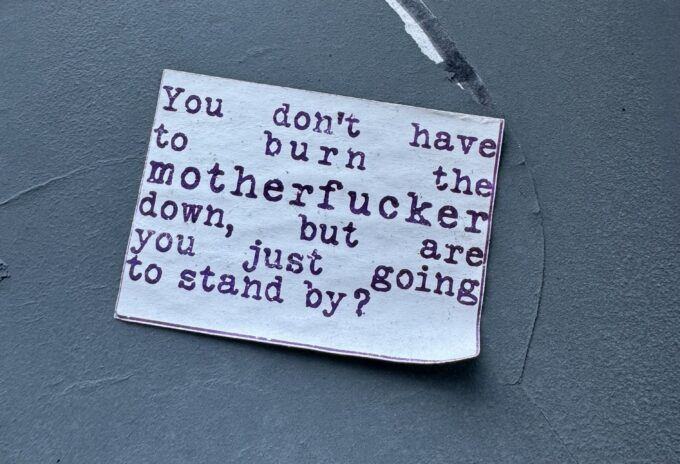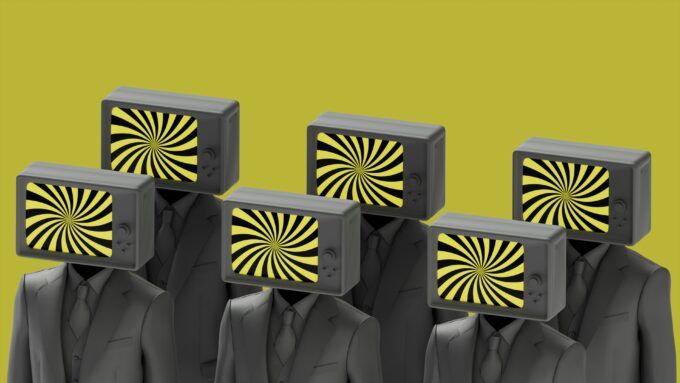
Quentin Tarantino’s Django Unchained ”
Django Unchained was the subject of controversy due to its use of racial epithets and depiction of slavery; many reviewers have defended the usage of the language by pointing out the historic context of race and slavery in America. Spike Lee, in an interview with Vibe magazine, said he would not see the film, explaining, ‘All I’m going to say is that it’s disrespectful to my ancestors. That’s just me . . . I’m not speaking on behalf of anybody else.’ Lee later tweeted, ‘American Slavery Was Not a Sergio Leone Spaghetti Western. It Was A Holocaust. My Ancestors Are Slaves. Stolen From Africa. I Will Honor Them.’ Writing in the Los Angeles Times, journalist Erin Aubry Kaplan noted the difference between Tarantino’s Jackie Brown and Django Unchained: ‘It is an institution whose horrors need no exaggerating, yet Django does exactly that, either to enlighten or entertain. A white director slinging around the n-word in a homage to ’70s blaxploitation à la Jackie Brown is one thing, but the same director turning the savageness of slavery into pulp fiction is quite another.'” — Wikipedia
Think of the French précis as a tweet distilled to no more than 140 characters but retaining the conceptual pithiness of a short essay, i.e., a thoughtful tweet. Or think of the tweet as a précis of what has not the conceptual substance to extend to a short essay, i.e., a mindless précis. A tweet of this essay on Django Unchained is this: “A European moral sense so low as to pursue ‘cash for flesh’ is not so low as to collaborate with the debased moral sense of American slave owners.” Christoph Waltz as Dr. King SchultzAs the European is a German, Dr. King Schultz, played by the German actor Christoph Waltz, I use the word “collaborate” to allude to the low level of moral sensibility displayed by the Third Reich in WWII. As a protesting tweet is sure to say: “A German should never be represented as morally superior to Americans, regardless of whether those Americans were slaveholders.” As my intention is not to argue what nationality can historically take the high ground morally speaking, I’m pleased to get the tweeting response and the issue out of the way. Whether a greater enlightened humanity or, to quote Lincoln, the better angels of our nature are more observable among Europeans than among Americans or vice versa, there can be no neutral verdict. But there is ample evidence that so-called American exceptionalism has made it very difficult to bring American manners and mores into any comparative frame, especially a European one. Take personal responsibilityTarantino does just that in Django Unchained. Rather than displaying a disrespect for enslaved blacks, the honored ancestors of blacks today, the film targets an ingrained sense of superiority in the antebellum South. This superiority is not limited, I argue, to that period or that region, nor is it greatly different than a sense of an American exceptionalism that locks the U.S. in as narrow a frame of awareness as that displayed in this film by the Southern slave owner. What we find in the American mass psyche of the present is a stubborn refusal to examine itself through foreign eyes. This refusal, while having disastrous effects not limited to the well-being of blacks today, is clearly an obstacle to moving blacks out of the poverty, ignorance, prisons, and ill health that a residing “Take Personal Responsibility” ethic cordons them within. The “foreign eyes” in this film are those of Dr. Schultz, who cannot look at the slave D’Artagnan being torn apart by dogs without trying to prevent it. His attempt to buy the slave fails, and he remains haunted by the sight of D’Artagnan’s death. Django, on the other hand, doesn’t flinch: “I’m just a little more used to Americans than he is,” he tells the slave owner Calvin Candie, played by Leonardo DiCaprio. Django is used to the American lens of seeing, which is not, in this case, wide enough to take in the European, Dr. Schultz’s, moral repulsion at the sight. If the narrowness of the American lens is a problem here, and in this case it’s the moral lens, is it possible that such narrowness has its ill effects in other domains, for instance, in regard to all those issues so bitterly fought now in a reengaged political civil war in the U.S. between liberals and neo-liberals? And are not those suffering poverty, illiteracy, imprisonment, ill health disproportionately American blacks? The conclusion here is not that Americans should bow to the Germans and Angela Merkel as the U.S.’s moral superiors, or to the French and their new socialist president, or the Chinese and so on. Tarantino doesn’t expound a superiority elsewhere but rather focuses sharply and dramatically on a historical moment in which a self-blinded social order and its resident power structure are grounded in ignorance kindled by arrogance. Combined with this we perceive as viewers a moral depravity and inhumanity resulting from a degenerated, inbred sense of reality and truth. The implication is that an expansion beyond this is what Dr. Schultz represents. Waltz and Jamie Foxx as Django The conclusion we are directed to is that foreign “others” expand the moral frame beyond the narrowness of the provincial “lord of the manor.” And this message itself can be expanded and applied to the present. How can a presently situated audience fail to do so? That Tarantino takes an impish and almost childish delight in exploding the blindness, the ignorance, the arrogance, the inhumanity in as many titillating moments as he can is part of his artistic license, but as his target — a corrupting power corrupted by its own insularity — is greatly consequential, that artistic license is in no manner abused. And because the evil and its causes are not merely historical but extend to the present moment, the significance of what he is about is greater yet. Tarantino directing DjangoIt is of course ironic and somewhat sad to note that what Tarantino achieves here is unexplored immediately because of his use of the n- word. Surely this repetitive use exposes the obscene inhumanity of this world of enslavement that suited a good part of the U.S. longer than any other nation in the world? An astounding moral obliviousness is revealed through our language, but that obliviousness is not remedied by the band-aid of political correctness. Tarantino pulls the band-aid off and asks us to look once again at the problems an American sense of provincial exceptionalism, an unearned confidence in a self-confined awareness, has created. Some unpackaging beyond a tweet: At some time and for various reasons every society reaching empire or nationalization has claimed exceptionalism in various domains. Some, like the Germans and the Japanese, have seen their own self-regard collapse into an apologetic retreat. Some, like the Greeks, live within the shadow of former greatness, while the Dutch, proud of their mercantile past, remain proud of their continued economic resilience. The British psyche has scaled back to its own shores but by riding the coattails of another English language-speaking country, the U.S., has maintained a respectable global image, rather like Balzac’s Cousin Bette. The French remain proud of both themselves in any period and in spite of the sneers such self-inflation attracts from its neighbors. Canada bears quietly and humbly its lack of luster on the global stage, though it ranks high in all matters tied to the quality of life. The Chinese await their moment on the global stage when their own exceptionalism defined in Asian not Western terms will be undeniable by all, as they dream of it. American exceptionalismIt’s probably true that in one way or another a country’s own blindness to the moral worth or unworthiness of its own history is a problem. That problem is the effect that such blindness, call it a misinterpretation, has on a present politics. The U.S. notion of “American exceptionalism,” and it here confines “American” to the U.S., can very possibly rest on the same sort of shaky foundation as do Calvin Candie’s presumptions, which range from his deserved and natural eminence to, ironically, his pretensions regarding French language and literature. The point is that if there is no observation outside the insularity of a professed exceptionalism, a country, like a person, can wander into a totally ungrounded, blind misinterpretation of what actually is the case. What Quentin Tarantino does in Django Unchained is not run amorally amok, broadcasting violence and racism at sensationalistic speed. What he exposes are the moral consequences of a historical blindness that the film leads us to ponder as persisting, though differently displayed, today. It is, however, noted that the bloodletting and the steady pitching of the word “nigger” into the mix at every turn has provoked a first response. Tarantino’s “pulping” of the idea of an American exceptionalism is not as handy or as usable a response as is the response to his use of the n-word, joyous sprees of violence, and the “pulping” of the horrors of American slavery. Tarantino stands accused of failing to pay the respect that this historical moment in American history deserves. In short, he fails to respect the U.S.’s own highly developed moral sense, one that must be obliged in words and images, if not in reality. Americans super-saturated with gratuitous violence on the screen, in video games, and in real life refuse to be subjected to it any longer. This refusal may not extend to any gun control reform even in the light of the Newtown massacre of children, but it has already extended to Tarantino’s movie. Tarantino and this movie make a convenient scapegoat, an accused prisoner brought before the High Court of American Morality. Because there is no robust enthusiasm to oppose guns, greed, and economic and social injustice in the real world, there must be a robust enthusiasm to do so in language and in the classroom, in politics and elsewhere, as well as in film. An exceptional moral sense, compassion, and high regard for individual humans rights, a thirst for justice, peace, democratic values, and so on have the sort of vibrant life that successful branding can achieve, a semiotic success in which word replaces world, in which pictures must hold a standard the world abuses. Blacks in prisonAmericans now also know that benighted Americans of the past used the word “nigger,” but the more morally enlightened Americans of the new Millennium do not. The American moral sense is not upset, however, by the condition of today’s “emancipated” blacks. People of color in the U.S., whether backs, Latinos, Asians, Native Americans, are more liable to be found below the poverty line than above it. And all minorities have had greater success in moving from the bottom quintile of income earners than have blacks, who have hardened into a niche within plutocracy that compares with that of the feudal peasant. Blacks in the U.S. are imprisoned in greater proportion than their proportion of the total American population, but, sad to say, they live longer and have better health care in than out of prison because drugs, shootings, diabetes, and unemployment ravage the “emancipated” blacks. Ironically, a black has a better life not free today than free. Lincoln’s well-finessed victory in establishing the 13th Amendment, shown in Spielberg’s film Lincoln with such an uplift to the national spirit, took real iron chains off blacks, but whatever inhumanity put these chains on them did not dissolve. That “inhumanity” remains nebulous and abiding “in the nature of things” in line with a Biblical tradition that accepts that “the poor will always be with us.” But if such inhumanity is attached to an economic system in which a zero wage cost produces the greatest profit, then any “inhumanity” resulting is no more than a “creative destruction.” The plight of blacks in the U.S. has not dissolved because the economic causes of that plight have not lessened but increased, from regional and national to global. Big Daddy, played by Don Johnson, and DiCaprio’s Calvin Candie are both all-empowered plantation owners, and the power they possess is only equaled today by our Wall Street barons, our hedge fund wizards, our transnational CEOs, our global technocapitalist elite. They don’t put blacks in chains, but they also don’t hire them; we don’t whip blacks or throw them into “hot boxes,” but we let them “assume personal responsibility” for the consequences of living in a plutocracy in which they remain at the bottom. That plutocracy preserves itself by directing the attention of an increasingly beleaguered middle class to an impoverished class that remains voiceless. ‘Slavery gets shit done’ T-shirtThe profit derived today from blacks is not from their free labor but from their usefulness by a plutocracy as a scapegoat, as a reliable underclass presence that confirms a middle class’s sense of its own superiority and accomplishment; and they, blacks, at the same time exist as the dark force behind the middle class’s own mounting economic difficulties. The American economic system now needs blacks as much as the American South needed its “niggers” and writes off the resulting inhumanity as an allowable and indeed welcomed “creative destruction.” I believe that Tarantino, once again as in Inglourious Basterds, proceeds like the unveiling, visceral filmmaker he is, to unveil something of that moral lapse or total absence that has not been rectified by a political enfranchisement, that has not been eliminated by making us all “equal under the law” and free from the bonds of enslavement. And no part of a misplaced sense of exceptionalism and the obliviousness it produces can be reached if Americans hold onto, within their own cultural mass psyche, the superiority of their own moral sense. That is, if Americans believe in an exceptionalism that need not compare itself and thereby adjust its claims relative to other nations, there is no possibility, absolutely none, of ever finally carrying through an emancipation of all from injustice, inequality, cruelty, violence, and racism. Here, then, is an explanation as to why Dr. Schultz will not shake Calvin Candie’s hand but feels that he must, as a moral imperative — “I couldn’t resist” — shoot him dead rather than shake that hand. Handshake?To shake that hand means that Dr. Schultz, a bounty hunter who will kill those who have a price on their head, will not comply with, will not accede to owning an equal share of, Candie’s moral blindness. It will mean his death if he fails to go along with Candie’s presumption that he, Candie, can order a man torn to pieces by dogs and yet hold on to an image of himself as a demi-god on this plantation, Candie Land, that he rules. Dr. Schultz, who is not “used to” this American moral sense, will not deny that any real moral sense exists at all, even if it means his death. Some emancipation begins here, which Tarantino happily celebrates as Django, in the film’s last scene, stars as the classic Western hero, a Roy Rogers with a prancing Trigger, who triumphs as the pretense of self-proclaimed exceptionalism blows up behind him. In the end it is not the savagery of slavery that is turned into pulp fiction but rather the American sense of moral exceptionalism that is pulped













